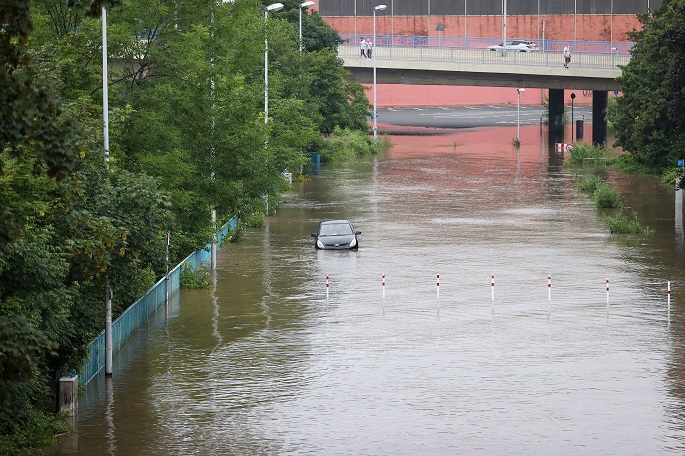Deadliest floods in decades strike Europe with heavy casualties
Published : 22 Jul 2021, 04:18
People in western Europe are still reeling from the devastating flash floods that claimed at least 194 lives and incurred overwhelming damages, with many already reflecting on the lessons from the ill-preparedness both in terms of the emergency warning system and in the face of more extreme weather events triggered by climate change.
By late Monday, floods triggered by raging rains had killed at least 163 in Germany and 31 in Belgium, reported Xinhua.
In Germany, many houses were destroyed, electricity and communication lines disrupted, and bridges and roads were buried by debris. Germany's army, fire brigade, Red Cross staff and volunteers are still working round the clock to clean up damage, as seen by Xinhua journalists in the worst affected town of Schuld in Rhineland-Palatinate on Monday.
According to an Impact Forecasting report provided by the insurance and reinsurance giant Aon, the July 12-15 floods are expected to result in an economic cost exceeding one billion euros.
In Belgium, the country's crisis center said 163 people were still missing as of Sunday. Around 120 cities and towns across the country were affected by the floods and nearly 40,000 families still have no access to electricity after days of torrential rains and burst rivers that had been unseen in Belgium for almost 200 years.
In Switzerland, while the situation around the local lakes and rivers is stabilizing, the government of the city of Fribourg has announced that the water networks of 11 municipalities in the Sarine district have been contaminated with faecal bacteria following recent heavy rains.
"I am sad and shocked to see the destruction... We would like to say as Europeans, we are with you, with all our heart in this difficult time," said European Commission President Ursula von der Leyen when she visited the affected communities in Belgium last Saturday.
"There is a link with climate change; we have to prepare our services for it," said Belgian Prime Minister Alexander De Croo.
"We must become faster in the fight against climate change," German Chancellor Angela Merkel said on Sunday, referring to a comprehensive analysis of what needs to be adapted in the areas of flood prevention, agriculture and forestry.
Karl Lauterbach, health politician of Germany's Social Democratic Party (SPD), also urged that lessons be drawn from the recent flood disaster. "We are just as ill-prepared in disaster protection as we are in pandemic protection," Lauterbach told local media.
"We must now adjust and prepare for the fact that there will be more natural disasters in the future and also regular pandemics. The infrastructure for this must be created and expanded, and civil protection is of central importance here," Lauterbach said.


